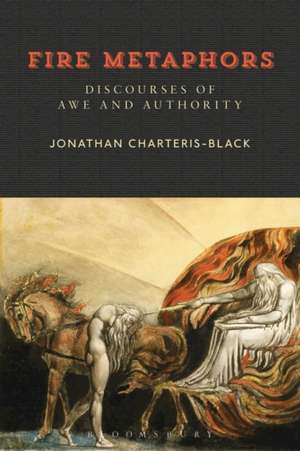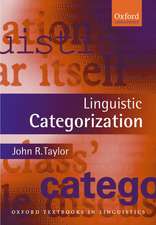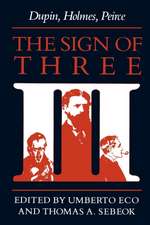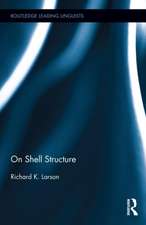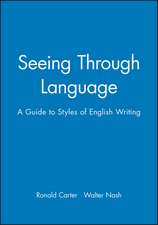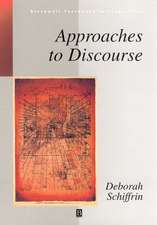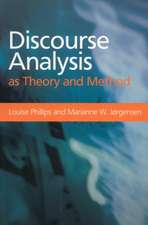Fire Metaphors: Discourses of Awe and Authority
Autor Jonathan Charteris-Blacken Limba Engleză Hardback – 16 noi 2016
| Toate formatele și edițiile | Preț | Express |
|---|---|---|
| Paperback (1) | 237.57 lei 6-8 săpt. | |
| Bloomsbury Publishing – 30 mai 2018 | 237.57 lei 6-8 săpt. | |
| Hardback (1) | 773.81 lei 6-8 săpt. | |
| Bloomsbury Publishing – 16 noi 2016 | 773.81 lei 6-8 săpt. |
Preț: 773.81 lei
Preț vechi: 1112.93 lei
-30% Nou
Puncte Express: 1161
Preț estimativ în valută:
148.08€ • 153.73$ • 123.48£
148.08€ • 153.73$ • 123.48£
Carte tipărită la comandă
Livrare economică 22 martie-05 aprilie
Preluare comenzi: 021 569.72.76
Specificații
ISBN-13: 9781472532541
ISBN-10: 1472532546
Pagini: 248
Dimensiuni: 156 x 234 x 22 mm
Greutate: 0.52 kg
Editura: Bloomsbury Publishing
Colecția Bloomsbury Academic
Locul publicării:London, United Kingdom
ISBN-10: 1472532546
Pagini: 248
Dimensiuni: 156 x 234 x 22 mm
Greutate: 0.52 kg
Editura: Bloomsbury Publishing
Colecția Bloomsbury Academic
Locul publicării:London, United Kingdom
Caracteristici
Showcases the rhetorical work that metaphor accomplishes in communicating evaluations and ideologies
Notă biografică
Jonathan Charteris-Black is Professor of Linguistics at University of West of England, UK.
Cuprins
Table of ContentsList of FiguresAcknowledgementsPART I: FIRE IN CULTURE, LANGUAGE AND THOUGHT1. The Meaning of Fire2. Investigating Fire Metaphors3. Fire, Emotion and CognitionPART II: FIRE IN RELIGIOUS DISCOURSE4. Fire in the Abrahamic Religions5. Fire in Zoroastrianism 6. Fire in Hinduism PART III: FIRE IN POLITICAL DISCOURSE7. Fire & Authority in 16th Century England: Foxe's Book of Martyrs8. Fire Metaphors in British Political Rhetoric9. Fire Metaphors in American Political Rhetoric10. Fire Metaphors in Visual Media: British Political CartoonsAppendix 1 - British SampleAppendix 2 - American SampleReferencesIndex
Recenzii
The book is successful both as an analysis of metaphor and an introduction to each of the text types it discusses. A broad range of linguists, religious studies scholars, theologians, and political scientists will find something useful within it, and the ability to draw them together in one text is especially admirable.
[It is] a substantial, relevant and important contribution, much like the author's previous works. There can be no reservation in recommending it.
Impressively detailed ... there is little doubt as to the contribution this monograph makes to the field: not only does it enhance our understanding of how we conceptualise fire ... but also proves how the intricacies of metaphoric thinking have and will continue to shape some of the most crucial aspects of the world in which we live.
The pheonomenon of fire has fascinated humans from the very beginnings of our history. In this highly accessible book, Jonathan Charteris-Black spells out the reasons why this is the case. Through doing a detailed cognitive linguistic analysis, he shows the metaphor-based symbolic meanings of fire in many of its uses in mythology, culture, religion, and current politics. A superb achievement - with wide-ranging implications for understanding how language, culture, and mind work together.
Jonathan Charteris-Black explores fire-metaphors across space and time, but argues an ambitious thesis. Fire is not simply a metaphor, but rather a transformative force from which metaphor itself arises as a linguistic universal. This book is rigorous and challenging.
[It is] a substantial, relevant and important contribution, much like the author's previous works. There can be no reservation in recommending it.
Impressively detailed ... there is little doubt as to the contribution this monograph makes to the field: not only does it enhance our understanding of how we conceptualise fire ... but also proves how the intricacies of metaphoric thinking have and will continue to shape some of the most crucial aspects of the world in which we live.
The pheonomenon of fire has fascinated humans from the very beginnings of our history. In this highly accessible book, Jonathan Charteris-Black spells out the reasons why this is the case. Through doing a detailed cognitive linguistic analysis, he shows the metaphor-based symbolic meanings of fire in many of its uses in mythology, culture, religion, and current politics. A superb achievement - with wide-ranging implications for understanding how language, culture, and mind work together.
Jonathan Charteris-Black explores fire-metaphors across space and time, but argues an ambitious thesis. Fire is not simply a metaphor, but rather a transformative force from which metaphor itself arises as a linguistic universal. This book is rigorous and challenging.
